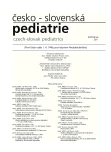-
Medical journals
- Career
Pediatric feeding disorders
Authors: M. Švekušová; Ľ. Podracká
Authors‘ workplace: I. Klinika detí a dorastu Lekárskej fakulty Univerzity P. J. Šafárika, Košice prednostka prof. MUDr. Ľ. Podracká, PhD.
Published in: Čes-slov Pediat 2011; 66 (1): 19-25.
Category: Review
Overview
Pediatric feeding disorders have been defined as an inability to consume orally adequate amount of nutrients in a quality and manner that are appropriate for a child´s developmental stage. Clinically they become manifest as food refusal, disorders of sucking, chewing and swallowing, or as behavioral problems during mealtimes. In chronically ill and neurologically impaired children they contribute to malnutrition, growth retardation and chronic dehydration with constipation. Aspiration during mealtimes can be a life threatening complication.
Pediatric feeding disorders are classified as sensory, oral motor, behavioral and complex. Primary pediatricians have a key role in early identification of children with increased risk of feeding problems, their diagnosis, and prevention of complications and initiation of therapy. The main goal is to achieve feeding that is safe (with minimal risk of aspiration), effective (with sufficient intake of nutrients in a reasonable time frame) and pleasurable for a child and caregivers.Key words:
pediatric feeding disorders, dysphagia, aspiration, malnutrition
Sources
1. Arvedson JC, Brodsky L. Pediatric Swallowing and Feeding: Assessment and Management. 2nd ed. Singular Publishing Group, 2002.
2. Rommel N, De Meyer AM, Feenstra L, et al. The complexity of feeding problems in 700 infants and young children presenting to a Tertiary Care Institution. J Pediatr Gastroenterol Nutr 2003; 37 : 75–84.
3. Rogers B. Feeding method and health outcomes of children with cerebral palsy. J Pediatr 2004;; 145: S28–S32.
4. Wilson EM, Hustad KC. Early feeding abilities in children with cerebral palsy: A parenteral report study. J Med Speech Lang Pathol 2009; March: nihpa57357.
5. Morales RC. Orofaciální regulační terapie. Praha: Portál, 2006.
6. Javorka V, Šimek J. Fyziológia gastrointestinálneho systému. In: Klinická fyziológia pre pediatrov. Martin: Osveta, 1996 : 200–236.
7. Cloud H, Ekvall SW, Hicks L. Feeding problems of the child with special health-care needs. In: Ekvall SW, Ekvall VK. Pediatric Nutrition in Chronic Diseases and Developmental Disorders. 2nd ed. Oxford University Press, 2005 : 172–182.
8. Arvedson JC, Rudolph CD. Feeding and swallowing issues relevant to pediatric nutrition support. In: Baker S, Baker R, Davis A. Pediatric Nutrition Support. Jones and Bartlett Publishers, 2007 : 149–158.
9. Katz RM. Feeding disorders. In: Koletzko B, et al. Pediatric Nutrition in Practice. Karger, 2008 : 196–199.
10. Jadcherla SR, Stoner E, et al. Evaluation and management of neonatal dysphagia: Impact of pharyngoesophageal motility studies and multidisciplinary feeding strategy. J Pediatr Gastroenterol Nutr 2009; 48 : 186–192.
11. Dellert SF, Hyams JS, Treem WR, et al. Feeding resistance and gastroesophageal reflux in infancy. J Pediatr Gastroenterol Nutr 1993; 17 : 66–71.
12. Byars KC, Burklow KA, et al. A multicomponent behavioral program for oral aversion in children dependent on gastrostomy feedings. J Pediatr Gastroenterol Nutr 2003; 37 : 473–480.
13. Levy Y, Levy A, et al. Diagnostic clues for identification of nonorganic vs. organic causes of food refusal and poor feeding. J Pediatr Gastroenterol Nutr 2009; 48 : 355–362.
14. Duff ALA, Wolfe SP, Dickson C, et al. Feeding behaviour problems in children with cystic fibrosis in the UK: Prevalence and comparison with healthy controls. J Pediatr Gastroenterol Nutr 2003; 36 : 443–447.
15. Kindermann A, Kneepkens CM, et al. Discontinuation of tube feeding in young children by hunger provocation. J Pediatr Gastroenterol Nutr 2008; 47 : 87–91.
16. Pozler O, Kolek A. Perkutánní endoskopická gastrostomie v pediatrii. In: Kohout P, Skladaný Ľ, et al. Perkutánní endoskopická gastrostomie a její místo v algoritmu umělé výživy. Praha: Galén, 2002 : 225–236.
17. Bunová B, Tedla M. Špecializované vyšetrenie hltacieho aktu. In: Tedla M, Komínek P, Chrobok V, et al. Poruchy polykání. Tobiáš, 2009 : 58–70.
18. Rommel N, Davidson G, Cain T, et al. Videomanometric evaluation of pharyngo-oesophageal dysmotility in children with velocardiofacial syndrome. J Pediatr Gastroenterol Nutr 2008; 46 : 87–91.
19. Thoyre SM, Shaker CS, Pridham KF. The early feeding skills assessment for preterm infants. Neonatal Netw 2005; 24(3): 7–16.
Labels
Neonatology Paediatrics General practitioner for children and adolescents
Article was published inCzech-Slovak Pediatrics

2011 Issue 1-
All articles in this issue
- Vaccination against pneumococcus in children in the Czech Republic in 2010–2011
- Screening the nutritional state upon admission of the child patient for hospitalization
- Prof. Jan Janda, M.D., Ph.D. – seventy years old young man
- The results of a five-year activity of Children Obesity Research Outpatient Department, Children Policlinic, Teaching Hospital Motol and 2nd Medical Faculty, Charles University, Prague
- The tast of the first cigarette: does it influence the progress of smoking behavior?
- Pediatric feeding disorders
- Autoimmune liver diseases in children. Part II
- Czech-Slovak Pediatrics
- Journal archive
- Current issue
- Online only
- About the journal
Most read in this issue- Pediatric feeding disorders
- Autoimmune liver diseases in children. Part II
- The tast of the first cigarette: does it influence the progress of smoking behavior?
- Prof. Jan Janda, M.D., Ph.D. – seventy years old young man
Login#ADS_BOTTOM_SCRIPTS#Forgotten passwordEnter the email address that you registered with. We will send you instructions on how to set a new password.
- Career

